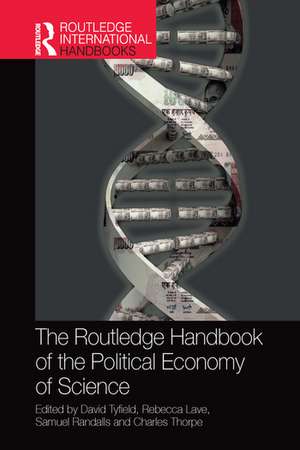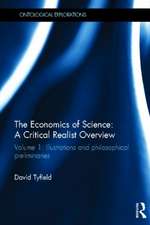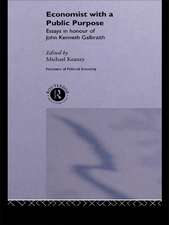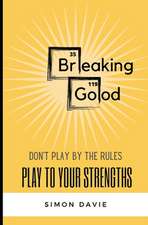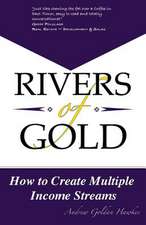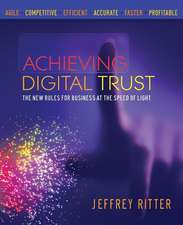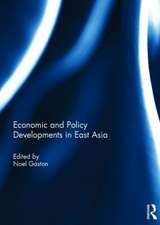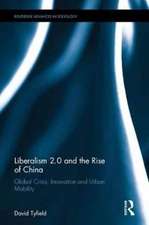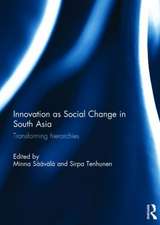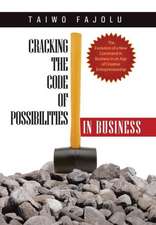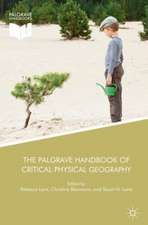The Routledge Handbook of the Political Economy of Science: Routledge International Handbooks
Editat de David Tyfield, Rebecca Lave, Samuel Randalls, Charles Thorpeen Limba Engleză Paperback – 30 iun 2020
Responding to this new urgency and uncertainty, this handbook presents a pioneering selection of the growing body of literature that has emerged in recent years at the intersection of science and technology studies and political economy. The central task for this research has been to expose important but consequential misconceptions about the political economy of R&I and to build more insightful approaches. This volume therefore explores the complex interrelations between R&I (both in general and in specific fields) and political economies across a number of key dimensions from health to environment, and universities to the military.
The Routledge Handbook of the Political Economy of Science offers a unique collection of texts across a range of issues in this burgeoning and important field from a global selection of top scholars. The handbook is essential reading for students interested in the political economy of science, technology and innovation. It also presents succinct and insightful summaries of the state of the art for more advanced scholars.
| Toate formatele și edițiile | Preț | Express |
|---|---|---|
| Paperback (1) | 434.54 lei 6-8 săpt. | |
| Taylor & Francis – 30 iun 2020 | 434.54 lei 6-8 săpt. | |
| Hardback (1) | 1219.07 lei 6-8 săpt. | |
| Taylor & Francis – 2 mai 2017 | 1219.07 lei 6-8 săpt. |
Din seria Routledge International Handbooks
-
 Preț: 371.78 lei
Preț: 371.78 lei -
 Preț: 375.50 lei
Preț: 375.50 lei -
 Preț: 362.19 lei
Preț: 362.19 lei -
 Preț: 352.08 lei
Preț: 352.08 lei - 9%
 Preț: 1487.70 lei
Preț: 1487.70 lei - 5%
 Preț: 317.31 lei
Preț: 317.31 lei -
 Preț: 372.05 lei
Preț: 372.05 lei -
 Preț: 361.19 lei
Preț: 361.19 lei -
 Preț: 390.13 lei
Preț: 390.13 lei -
 Preț: 311.91 lei
Preț: 311.91 lei - 9%
 Preț: 1488.67 lei
Preț: 1488.67 lei -
 Preț: 390.22 lei
Preț: 390.22 lei -
 Preț: 347.74 lei
Preț: 347.74 lei -
 Preț: 347.74 lei
Preț: 347.74 lei - 9%
 Preț: 1490.11 lei
Preț: 1490.11 lei -
 Preț: 356.22 lei
Preț: 356.22 lei -
 Preț: 348.27 lei
Preț: 348.27 lei - 5%
 Preț: 328.11 lei
Preț: 328.11 lei -
 Preț: 394.24 lei
Preț: 394.24 lei - 8%
 Preț: 392.89 lei
Preț: 392.89 lei - 8%
 Preț: 422.42 lei
Preț: 422.42 lei -
 Preț: 357.22 lei
Preț: 357.22 lei - 8%
 Preț: 421.97 lei
Preț: 421.97 lei - 5%
 Preț: 452.16 lei
Preț: 452.16 lei -
 Preț: 341.55 lei
Preț: 341.55 lei - 9%
 Preț: 1651.61 lei
Preț: 1651.61 lei - 9%
 Preț: 1665.70 lei
Preț: 1665.70 lei -
 Preț: 381.91 lei
Preț: 381.91 lei -
 Preț: 350.20 lei
Preț: 350.20 lei -
 Preț: 347.74 lei
Preț: 347.74 lei - 20%
 Preț: 1401.00 lei
Preț: 1401.00 lei -
 Preț: 342.76 lei
Preț: 342.76 lei -
 Preț: 345.63 lei
Preț: 345.63 lei -
 Preț: 345.16 lei
Preț: 345.16 lei -
 Preț: 353.88 lei
Preț: 353.88 lei -
 Preț: 1057.72 lei
Preț: 1057.72 lei -
 Preț: 344.90 lei
Preț: 344.90 lei - 5%
 Preț: 337.33 lei
Preț: 337.33 lei -
 Preț: 365.90 lei
Preț: 365.90 lei - 9%
 Preț: 1528.86 lei
Preț: 1528.86 lei -
 Preț: 346.77 lei
Preț: 346.77 lei -
 Preț: 392.48 lei
Preț: 392.48 lei - 9%
 Preț: 1454.51 lei
Preț: 1454.51 lei - 5%
 Preț: 326.85 lei
Preț: 326.85 lei -
 Preț: 346.11 lei
Preț: 346.11 lei -
 Preț: 361.74 lei
Preț: 361.74 lei - 9%
 Preț: 1349.74 lei
Preț: 1349.74 lei - 19%
 Preț: 422.81 lei
Preț: 422.81 lei - 8%
 Preț: 385.56 lei
Preț: 385.56 lei
Preț: 434.54 lei
Nou
Puncte Express: 652
Preț estimativ în valută:
83.15€ • 87.03$ • 69.21£
83.15€ • 87.03$ • 69.21£
Carte tipărită la comandă
Livrare economică 31 martie-14 aprilie
Preluare comenzi: 021 569.72.76
Specificații
ISBN-13: 9780367581275
ISBN-10: 0367581272
Pagini: 486
Dimensiuni: 174 x 246 x 30 mm
Greutate: 0.89 kg
Ediția:1
Editura: Taylor & Francis
Colecția Routledge
Seria Routledge International Handbooks
Locul publicării:Oxford, United Kingdom
ISBN-10: 0367581272
Pagini: 486
Dimensiuni: 174 x 246 x 30 mm
Greutate: 0.89 kg
Ediția:1
Editura: Taylor & Francis
Colecția Routledge
Seria Routledge International Handbooks
Locul publicării:Oxford, United Kingdom
Public țintă
Postgraduate and UndergraduateNotă biografică
David Tyfield is a Reader in Environmental Innovation and Sociology at the Lancaster Environment Centre, Lancaster University, UK, and Research Professor at the Chinese Academy of Sciences Guangzhou Institute of Geochemistry (GIGCAS).
Rebecca Lave is an Associate Professor in Geography at Indiana University, USA.
Samuel Randalls is a Lecturer in Geography at University College London, UK.
Charles Thorpe is an Associate Professor in the Department of Sociology and a member of the Science Studies Program at the University of California, San Diego, USA.
Rebecca Lave is an Associate Professor in Geography at Indiana University, USA.
Samuel Randalls is a Lecturer in Geography at University College London, UK.
Charles Thorpe is an Associate Professor in the Department of Sociology and a member of the Science Studies Program at the University of California, San Diego, USA.
Recenzii
'Political economy goes all the way down. It saturates every nook and cranny of the production of scientific knowledge, technology, and the endless supply of hi-tech devices, gizmos, and applications. There is nothing pure and simple about any of them as this Handbook incisively demonstrates. They are all sullied. There are always political economic stories to tell, which this book does with historical precision, theoretical verve and persuasive eloquence.' — Trevor Barnes, Professor of Geography, the University of British Columbia, Canada
Descriere
The political economy of research and innovation (R&I) is one of the central issues of the early 21st century. Responding to this urgency, this handbook presents a pioneering selection of the growing body of literature that has emerged in recent years at the intersection of science & technology studies and political economy.
Cuprins
Introduction: beyond crisis in the knowledge economy
David Tyfield, Rebecca Lave, Samuel Randalls and Charles Thorpe
Part I From the ‘economics of science’ to the ‘political economy of research and innovation’
1. The political economy of science: prospects and retrospects
David Edgerton
2. The “marketplace of ideas” and the centrality of science to neoliberalism
Edward Nik-Khah
3. The political economy of the Manhattan project
Charles Thorpe
4. The knowledge economy, the crash and the depression
Ugo Pagano and Maria Alessandra Rossi
5. Science and engineering in digital capitalism
Dan Schiller and ShinJoung Yeo
6. US Pharma’s business model: why it is broken, and how it can be fixed
William Lazonick, Matt Hopkins, Ken Jacobson, Mustafa Erdem Sakinç and Öner Tulum
7. Research & innovation (and) after neoliberalism: the case of Chinese smart e-mobility
David Tyfield
Part II Institutions of science and science funding
8. Controlled flows of pharmaceutical knowledge
Sergio Sismondo
9. Open access panacea: scarcity, abundance, and enclosure in the new economy of academic knowledge production
Chris Muellerlisle
10. The political economy of higher education and student debt
Eric Best and Daniel Rich
11. Changes in Chinese higher education in the era of globalization
Hongguan Xu and Tian Ye
12. Financing technoscience: finance, assetization and rentiership
Kean Birch
13. The ethical government of science and innovation
Luigi Pellizzoni
14. The political economy of military science
Chris Langley and Stuart Parkinson
Part III Fields of science
15. Genetically engineered food for a hungry world: a changing political economy
Rebecca Harrison, Abby Kinchy, and Laura Rabinow
16. Biodiversity offsetting
Rebecca Lave and Morgan Robertson
17. Distributed biotechnology
Alessandro Delfanti
18. Translational medicine: science, risk and an emergent political economy of biomedical innovation
Mark Robinson
19. Are climate models global public goods?
Leigh Johnson and Costanza Rampini
20. Renewable energy research and development: a political economy perspective
David J. Hess and Rachel G. McKane
21. Synthetic biology: a political economy of molecular futures
Jairus Rossi
Part IV Governing science and governing through science
22. Toward a political economy of neoliberal climate science
Larry Lohmann
23. Commercializing environmental data
Samuel Randalls
24. Science and standards
Elizabeth Ransom, Maki Hatanaka, Jason Konefal and Allison Loconto
25. Agnotology and the new politicization of science and scientization of politics
Manuel Fernández Pinto
26. Reconstructing or reproducing? Scientific authority and models of change in two traditions of citizen science
Gwen Ottinger
Part V (Political economic) geographies of science
27. The transformation of Chinese science
Richard P. Suttmeier
28. Postcolonial technoscience and development aid: insights from the political economy of locust control expertise
Claude Peloquin
29. World-system analysis 2.0: globalized science in centers and peripheries
Pierre Delvenne and Pablo Kreimer
30 From science as “development assistance” to “global philanthropy”
Hebe Vessuri
31. Traveling imaginaries: the “practice turn” in innovation policy and the global circulation of innovation models
Sebastian Pfotenhauer and Sheila Jasanoff
32. What is science critique? Lessig, Latour
Phil Mirowski
David Tyfield, Rebecca Lave, Samuel Randalls and Charles Thorpe
Part I From the ‘economics of science’ to the ‘political economy of research and innovation’
1. The political economy of science: prospects and retrospects
David Edgerton
2. The “marketplace of ideas” and the centrality of science to neoliberalism
Edward Nik-Khah
3. The political economy of the Manhattan project
Charles Thorpe
4. The knowledge economy, the crash and the depression
Ugo Pagano and Maria Alessandra Rossi
5. Science and engineering in digital capitalism
Dan Schiller and ShinJoung Yeo
6. US Pharma’s business model: why it is broken, and how it can be fixed
William Lazonick, Matt Hopkins, Ken Jacobson, Mustafa Erdem Sakinç and Öner Tulum
7. Research & innovation (and) after neoliberalism: the case of Chinese smart e-mobility
David Tyfield
Part II Institutions of science and science funding
8. Controlled flows of pharmaceutical knowledge
Sergio Sismondo
9. Open access panacea: scarcity, abundance, and enclosure in the new economy of academic knowledge production
Chris Muellerlisle
10. The political economy of higher education and student debt
Eric Best and Daniel Rich
11. Changes in Chinese higher education in the era of globalization
Hongguan Xu and Tian Ye
12. Financing technoscience: finance, assetization and rentiership
Kean Birch
13. The ethical government of science and innovation
Luigi Pellizzoni
14. The political economy of military science
Chris Langley and Stuart Parkinson
Part III Fields of science
15. Genetically engineered food for a hungry world: a changing political economy
Rebecca Harrison, Abby Kinchy, and Laura Rabinow
16. Biodiversity offsetting
Rebecca Lave and Morgan Robertson
17. Distributed biotechnology
Alessandro Delfanti
18. Translational medicine: science, risk and an emergent political economy of biomedical innovation
Mark Robinson
19. Are climate models global public goods?
Leigh Johnson and Costanza Rampini
20. Renewable energy research and development: a political economy perspective
David J. Hess and Rachel G. McKane
21. Synthetic biology: a political economy of molecular futures
Jairus Rossi
Part IV Governing science and governing through science
22. Toward a political economy of neoliberal climate science
Larry Lohmann
23. Commercializing environmental data
Samuel Randalls
24. Science and standards
Elizabeth Ransom, Maki Hatanaka, Jason Konefal and Allison Loconto
25. Agnotology and the new politicization of science and scientization of politics
Manuel Fernández Pinto
26. Reconstructing or reproducing? Scientific authority and models of change in two traditions of citizen science
Gwen Ottinger
Part V (Political economic) geographies of science
27. The transformation of Chinese science
Richard P. Suttmeier
28. Postcolonial technoscience and development aid: insights from the political economy of locust control expertise
Claude Peloquin
29. World-system analysis 2.0: globalized science in centers and peripheries
Pierre Delvenne and Pablo Kreimer
30 From science as “development assistance” to “global philanthropy”
Hebe Vessuri
31. Traveling imaginaries: the “practice turn” in innovation policy and the global circulation of innovation models
Sebastian Pfotenhauer and Sheila Jasanoff
32. What is science critique? Lessig, Latour
Phil Mirowski
